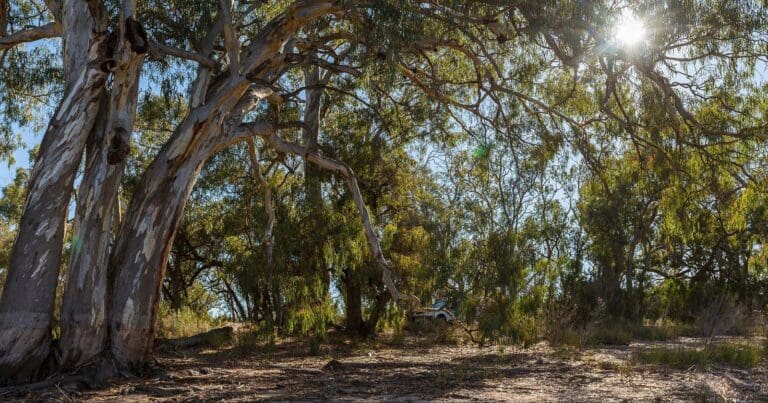Hike at a Glance
Max elevation: 60m
Min elevation: 41m
Total Ascent: 136m
Hike overview
The Camel Pad Track walk commences just north of the Hattah Outback Roadhouse and traverses a constantly changing landscape, with typical Mallee scrub of eucalypt and Porcupine Grass giving way to different vegetation as the track passes through open woodlands, over sand dunes, and beside a large salt pan. See the local wildlife up close, with kangaroos and emus grazing in the open areas or resting in the shade. Camels were used to transport salt from the Sunset Country to the Murray River along this track 100 years ago. Led by Afghan team masters, the camel teams carried cargoes of salt from Spectacle Lakes to the Murray River, where the salt was loaded onto paddle steamers that returned with precious fresh water and supplies.
This can be done as a return hike, turning around at the Old Calder Highway or you can continue your journey to finish at the Lake Mournpall Campground. This one way alternative is also around 10km and will take approximately 2.5 hrs.
Hattah-Kulkyne National Park is paradise for birdwatchers, as the dry country and lakes offer habitat for over 200 species. Colourful galahs, parrots and Major Mitchell Cockatoos are often seen, while waterbirds such as pelicans, swans, ducks and grebes frequent Lake Mournpall at the end of the trail. Keep an eye also for the abundant wildlife. Kangaroos and emus can frequently be spotted, as well as a variety of birds, including wedge-tailed eagles, whitebellied sea eagles and whistling kites.
Camping
There are two designated campgrounds in the park with basic facilities, including non-flush toilets, fireplaces and picnic tables. They are at Lake Hattah and further north at Lake Mournpall. Advance bookings and payment are required for these sights via the Parks Victoria website. Other river camping areas without facilities are available at Ki Bend, Firemans Bend and Jinkers Bend, all along the Murray at the eastern edge of the park. No booking or fees are required, although these areas are best accessed with a 4WD.
Gallery
Got some great shots from this hike? Upload your photos here to inspire others and show off the beauty of the trail!
Click to view form >>
Submitting your photos doesn’t mean you lose ownership. You can be credited for your contributions, and you can request removal at any time.
Content use
Please don’t copy GPX files or content from this site to AllTrails or other platforms. Each trail has been personally mapped, documented, and refined to support Australia’s bushwalking and hiking community. While some details come from land managers, every listing reflects significant personal effort. This is a free, community-driven initiative—your respect helps keep it that way.
Walk map and GPX file
Max elevation: 60 m
Min elevation: 41 m
Total climbing: 136 m
Total descent: -136 m
Getting there
Getting to the trailhead: Hattah-Kulkyne National Park.
Hattah-Kulkyne National Park is half way between Ouyen and Mildura, off the Calder Highway. It’s a hefty 5.5 hours’ drive from Melbourne, but only 45 minutes due south of Mildura. Most visitors enter via the Hattah Entrance Road and head directly for the Lake Hattah Campground. The park extends north and east, covering 48,000 hectares, before hitting the Murray River off HattahRobinvale Road not far from the small village of Liparoo. Many of the park’s best spots are accessible in a 2WD car, but some tracks are 4WD only. Be especially careful if there’s been recent rain.
Closest towns to this walk: Hattah, Irymple, Kulkyne, Merbein, Mildura, Nangiloc, Ouyen, Red Cliffs
About the region
Hattah-Kulkyne National Park lies in typical mallee country with extensive low scrub and open native pine woodland. Superbly adapted birds, animals and vegetation thrive in the poor, sandy soils and searing summers. The freshwater Hattah Lakes is seasonally filled by creeks connected to the Murray, providing food and shelter for waterbirds and fish. These lakes can remain full for up to ten years without flooding, but flooding generally occurs once every two years. Camping, walking, bike riding and canoeing are popular here and in the adjoining Murray-Kulkyne Park.
Similar walks nearby
Looking for more walks in or near Hattah-Kulkyne National Park? Try these trails with a similar difficulty grade.
Track grade
Grade 3 (Moderate) - Walks for Most Fitness Levels: Grade 3 on the AWTGS represents moderate walking tracks. These are ideal for walkers with some fitness who are comfortable with some hills and uneven terrain. While suitable for most ages, some bushwalking experience is recommended to ensure a safe and enjoyable experience. Tracks may have short, steep hill sections, a rough surface, and many steps. The total distance of a Grade 3 walk can be up to 20 kilometers.
Explore safe
Plan ahead and hike safely! Carry enough water, pack layers for changing conditions, and bring safety gear like a torch, PLB, and reliable communication device. Check official sources for trail updates, closures, and access requirements, and review local weather and bushfire advice. Most importantly, share your plans with someone before you go. Being prepared makes for a safer and more enjoyable hike! Stay Safe, Explore More, and Always #ExploreSafe.
Packing checklists
What you carry in your pack depends on factors like weather, terrain, and your adventure type. Not sure what to bring? My free planning, food, and packing checklists are a great starting point, covering day hikes, overnight trips, and multi-day adventures. Use them to customise your kit and always prioritise safety.
Let someone know
Before heading out, take a moment to fill out your trip intentions form. It’s a quick way to share your hike details with family or friends. If something goes wrong, they can notify emergency services, ensuring a faster response and peace of mind. Stay safe and enjoy your adventure
Suggest an edit
Spotted a change on this trail? Maybe there are new features, the route has shifted, or the trail is permanently closed. Whatever the update, I’d love your input. Your feedback helps fellow hikers stay informed and ensures that our trail info stays fresh and reliable.
Acknowledgement of Country
Trail Hiking Australia acknowledges the Traditional Owners of the lands on which we hike and pay respects to their Elders, past and present, and we acknowledge the First Nations people of other communities who may be here today.






